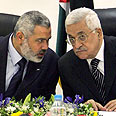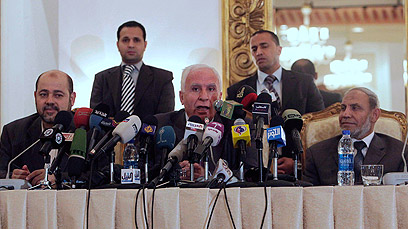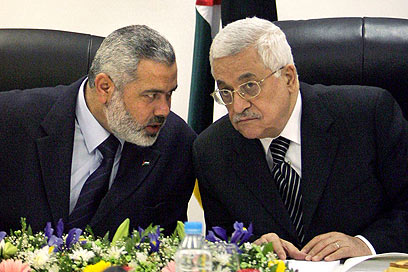
The good, the bad and the PA-Hamas pact
Will impending reconciliation between Palestinian Authority and Gaza rulers breathe new life into peace talks or breed new wave of terror?
The ink is barely dry on Wednesday's reconciliation treaty between rival Palestinian factions Fatah and Hamas, and the flurry of speculations as to its potential outcome is in full swing. Some Israeli experts doubt it will ever truly come to fruition, but say Israel must be wary of global recognition in a Hamas-run Palestinian Authority; while others say the internal truce will help control Hamas and resuscitate the Israeli-Palestinian peace process.
"This deal is good news for anyone truly seeking a peace deal and an excellent excuse to say Abu Mazen has made a pact with terror, like we've heard Netanyahu say," former Foreign Minister Prof. Shlomo Ben-Ami said Thursday.
Islam, he explained, can never truly be excluded from an Arab entity: "The best deal will include a formula that will restrain Hamas. Abu Mazen is in the midst of an international campaign to garner recognition in a Palestinian state. It makes no sense for him to make a pact with a terror organization.
"This should be an Israeli interest – right now Abbas is devoid any legitimacy as the Palestinian president and Fatah rule in the West Bank is no more democratic that Hamas rule in Gaza."
Ben-Ami further said that the reconciliation improves the Palestinians' chances of statehood: "It increases their chances, providing Hamas becomes more moderate, but this can also be used as a platform for counter-propaganda."

Hamas-Fatah press conference in Cairo (Photo: Reuters)
Dr. Yossi Beilin, one of the chief architects of the Oslo Accords, added that if a Fatah-Hamas unity government is formed and Hamas accepts Mahmoud Abbas as the negotiator on behalf of the Palestinian people, the latter's plans for September will be twice empowered.
"Israel often claims that Abu Mazen does not represent the entire Palestinian people, but once there is a unity government, that claim is invalid," he said, adding that the international community is likely to recognize such an institution.
"A status quo is a positive thing, since it is in Israel's interest to have one Palestinian address for talks. If such a government is formed and will agree to a complete ceasefire with Israel, including in Gaza, we will have to negotiate with it.
"This gives Israel an advantage because it give Abbas a new hold in Gaza. But anyone unwilling to promote the peace process will see this as an opportunity to do nothing. I assume that is what Netanyahu will do."
The beginning of the end for Abbas'?
Major General (Res.) and former Head of Israel's National Security Council Uzi Dayan said that the reconciliation shows that "there is no difference between the Palestinian Authority and Hamas. I think this is the beginning of the end for Abbas. From now on, he will be held responsible for every rocket fired from Gaza. He will also be responsible for Gilad Shalit."
Dayan further estimated that this new Palestinian development decreased the chances for direct negotiations with the Palestinians, saying the timing suggests that the Palestinian faction are trying to pave their way to easier international recognition in a Palestinian state.
"They are trying to play both sides against the middle and separate the issue of state from the issue of peace with Israel. Abu Mazen will be able to say Hamas is responsible for some statements, and the challenge will be to see through their game."

Best friends forever? Abbas and Haniyeh (Photo: Reuters)
The former NSC chief stressed that come September, "Israel will have to insist more than ever on (Palestinian) recognition of the Jewish state, a united Jerusalem, zero right of return and defensible borders.
"The immediate risk is that Hamas will drive its hooks deeper into the West Bank and rocket fire may emanate from there... The complete demilitarization of the West Bank is doubly important now."
Dayan further said that the Palestinian factions' reconciliation is not a positive thing as far as Israel is concerned. "If the world buys into this alliance, it increases chances that Hamas will take over the Palestinian Authority."
Gaping differences
The treaty, which aims to end a four-year spilt, has already been dubbed "historic." Nevertheless, while political experts doubt the longevity of the pact, they also warn that Israel may find itself facing an undesirable situation where there is global recognition of a Hamas-run Palestinian Authority.
Dr. Mordechai Kedar of the Begin-Sadat Center for Strategic Studies said Thursday that the treaty is unlikely to last, explaining that the political and cultural gaps between Hamas and Fatah were essentially to deep to ever be bridged. "Many treaties have been signed throughout the years and were not upheld, so there is no reason to believe this one will fare any better… Their way of thinking is too different and cannot be reconciled."
Kedar added he does not think Hamas will cede its rule over Gaza and will refuse to recognize any commitment made by Fatah to Israel: "In that respect, Abbas could continue to negotiate with Israel, but Hamas will not be bound by any deal… The greater fear is that Hamas will win next year's elections and will rule the PA completely."
Dr. Ephraim Lavie, Director of the Tami Steinmetz Center for Peace Research at Tel Aviv University, also doubts the sincerity of the reconciliation: "The real risk is that this deal will be derailed and lead to another conflict between the parties," he said.
Israel, he added, cannot continue to object to a Palestinian reconciliation on one side, while saying it has no partner for peace because Abbas does not control the Gaza Strip. "Israel must realize that the two-state solution has to consider the West Bank and Gaza as one territorial unit, so they must be allowed to hold free, democratic election in both places.
Abbas will fare better in the coming Palestinian elections if he presents progress in the Israeli-Palestinian peace talks, Lavie said. "In such a case, it is likely that the moderates will prevail."
Prof. Yoram Meital of the Chaim Herzog Center for Middle East Studies and Diplomacy believes that the controversial recognition may boost the peace process.
"The Palestinian fear that they cannot make a play for statehood as long as the factions are divided, and this pact bolsters their international standing. It is important to understand that if Hamas is embraced by the international community, it may compel them to abide by compromises they refused to accept in the past."
Roi Kais and Tomer Velmer contributed to this report
- Follow Ynetnews on Facebook










